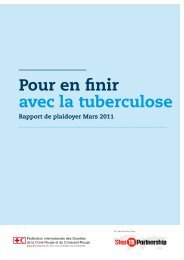Thailand - Stop TB Partnership
Thailand - Stop TB Partnership
Thailand - Stop TB Partnership
Create successful ePaper yourself
Turn your PDF publications into a flip-book with our unique Google optimized e-Paper software.
High-level political commitment?<br />
The adoption of the Amsterdam Declaration to <strong>Stop</strong> <strong>TB</strong> in 2000 marked an important<br />
milestone in the attempt to muster high-level political commitment to a reinvigorated global<br />
<strong>TB</strong> control effort. Governments of the countries with the highest burden of <strong>TB</strong> pledged<br />
to expand access to the WHO-recommended DOTS framework for <strong>TB</strong> control in their<br />
countries; 2 to ensure sufficient human and financial resources to support implementation;<br />
to monitor and evaluate their national <strong>TB</strong> programs in line with WHO standards; to ensure<br />
“quality, access, transparency and timely supply” of <strong>TB</strong> drugs; and to support partnerships<br />
with NGOs and the community. 3<br />
However, rhetorical commitment to the Declaration has not been reflected in adequate<br />
budgetary allocations at the national and subnational levels. Without strong national<br />
leadership, state and local officials are less likely to give budgetary priority to either <strong>TB</strong> control,<br />
particularly in highly decentralized political systems as in Brazil and Nigeria, or health<br />
care reforms, as in Tanzania and <strong>Thailand</strong>, where cost-cutting measures have had a dramatic<br />
impact on the capacity of national <strong>TB</strong> programs, particularly with regard to monitoring and<br />
evaluation, staffing, and training.<br />
Underfunding of the health sector in general has compromised capacity to treat <strong>TB</strong><br />
within existing public health systems in Bangladesh, Nigeria, and Tanzania. The executive<br />
director of Nigeria’s National Primary Health Care Development Agency commented that<br />
“where [primary health care] services are available, the quality is such that people prefer<br />
to go elsewhere for the services.” 4 Public Health Watch researchers from all five countries<br />
judged that government spending on <strong>TB</strong> was inadequate to ensure the effective implementation<br />
of national <strong>TB</strong> policies. For example, only about two-thirds of all Bangladeshi laboratories<br />
have the capacity to perform high-quality smear tests, 5 and laboratory rooms in some<br />
subdistricts are small and poorly ventilated, creating health risks for staff. As researcher<br />
Afsan Chowdhury noted, “If you measure political commitment [in Bangladesh] in terms<br />
of resource mobilization—if you see this as a measure of the extent to which <strong>TB</strong> is on the<br />
political agenda—it’s low, there’s not much.” 6 <strong>TB</strong> workers are underpaid and overworked,<br />
leading to high turnover, sagging morale, and low recruitment. As funding for <strong>TB</strong> control<br />
has declined in Brazil over the past few decades, so has the prestige of <strong>TB</strong> work, even as<br />
increased investment in HIV/AIDS since the early 1990s has helped enhance the status of<br />
HIV/AIDS workers.<br />
In Brazil, Nigeria, Tanzania, and <strong>Thailand</strong>, the HIV/AIDS epidemic has fueled a<br />
dramatic resurgence in <strong>TB</strong> rates and put an additional strain on health infrastructures, yet<br />
governments have been slow to respond with corresponding increases in <strong>TB</strong> budgets and<br />
personnel. In Tanzania, the resurgence in <strong>TB</strong> rates—a six-fold increase in the number of<br />
cases between 1983 and 2003—has largely been attributed to the HIV epidemic. HIV preva-<br />
14<br />
<strong>TB</strong> POLICY IN THAILAND



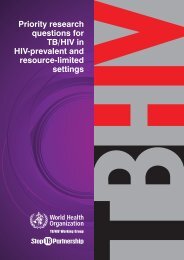

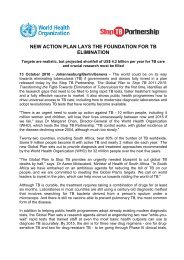

![Global Drug Facility Annual Report 2011 [.pdf] - Stop TB Partnership](https://img.yumpu.com/26788745/1/184x260/global-drug-facility-annual-report-2011-pdf-stop-tb-partnership.jpg?quality=85)

![Concept note on national stop TB partnership [.pdf]](https://img.yumpu.com/26788741/1/184x260/concept-note-on-national-stop-tb-partnership-pdf.jpg?quality=85)

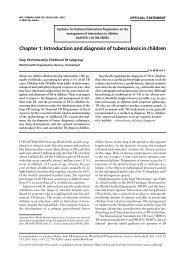
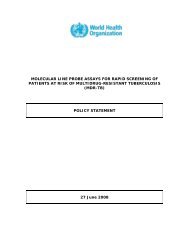
![2005 and Challenges for 2006 - 2015 [.pdf] - Stop TB Partnership](https://img.yumpu.com/26788674/1/190x245/2005-and-challenges-for-2006-2015-pdf-stop-tb-partnership.jpg?quality=85)
![Brochure (French) [.pdf] - Stop TB Partnership](https://img.yumpu.com/17234792/1/190x91/brochure-french-pdf-stop-tb-partnership.jpg?quality=85)

